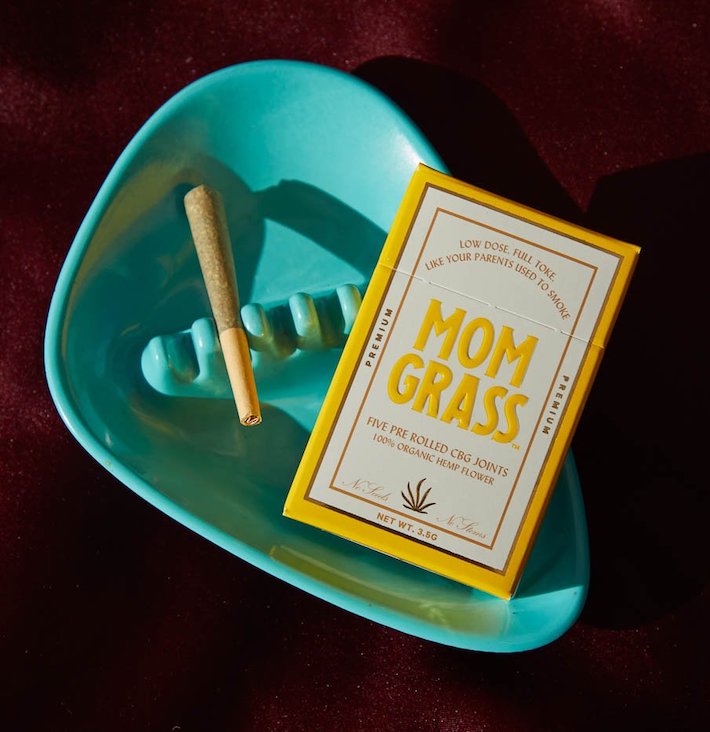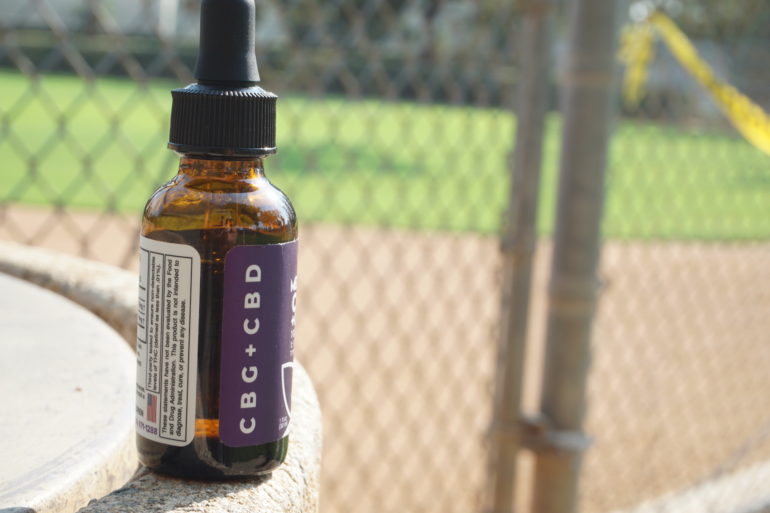CBD is the medical rockstar of the cannabinoid world. It is the only naturally-derived cannabinoid that is FDA-approved for rare childhood seizure disorders, given as pharmaceutical Epidiolex®. CBD and CBG are commonly found in legal hemp and cannabis products.
Small clinical trials suggest CBD may also have potential benefits for anxiety, psychiatric disorders, neuroprotection, pain, autoimmune and inflammatory diseases, and substance use.
CBG, or cannabigerol, works similarly to both CBD and THC. Thus potentially sharing many of the same benefits of both without the high. Ironically, CBG actually leans towards THC-like effects and side effects minus the cognitive impact.
Key Differences Between CBG and CBD
CBD and CBG open avenues for a wider patient population to benefit from cannabis and hemp without cognitive effects. They share much more in common than not, but CBG does act more like THC.
Although some people may think of CBD as THC without the cognitive effects, this common misconception is actually more accurate when comparing CBG and THC.
Another critical difference is in the amount of research behind CBD, which is so strong that it has earned the gold standard of medical approval to treat certain conditions. We are just beginning to learn about the effects of CBG.
Characteristics
- CBD and CBG are non-intoxicating alternatives to THC
- CBD is much more researched and well-known to science
- CBG appears to have a similar therapeutic and safety profile, but only one clinical study exists
Sourcing
- CBD is most often sourced from CBD-dominant (type III) cannabis
- CBG dominance defines type IV cannabis plants
- Hemp can be selectively bred to produce a 100% CBGA and CBG profile
- The highest concentration of CBG lies in the flowers and buds at the tallest parts of the plant, about 10 times more than fan leaves
Legality
- CBD and CBG usually come from legal hemp, but are also found in other cannabis plants
- They may come in varying ratios with other cannabinoids, or with THC in state-legal products
- To meet federal legality, CBD and CBG hemp products must have <0.3% THC by dry weight
Drug Testing
- Isolated CBD and CBG do not generate the target metabolites of drug screening (THC-COOH)
- However, repeat use of full-spectrum or THC-contaminated hemp products may cause a gradual buildup of THC metabolites that may be problematic for drug testing
CBG: Possible Benefits and Side Effects

CBG Benefits
CBG is made naturally from CBGA, the granddaddy of most of our favorite cannabinoids. CBGA also gives rise to THCA, THC, CBCA, CBDA, and CBD. Because of this lineage, their effects can be quite similar but with a few nuances.
CBG’s weak activity on cannabinoid receptors (CB1 and CB2) means patients won’t get high.
In the first clinical survey on CBG-dominant products, patients reported using CBG for symptomatic relief of:
- Anxiety
- Chronic and acute pain
- Depression
- Insomnia
- Sleep disturbances
- Migraines
- Headaches
- Nausea
- Irritable bowel syndrome
- Crohn’s disease and ulcerative colitis
- Cancer-related symptoms and treatments
- Fibromyalgia
- Glaucoma
- PMDD and menopause symptoms
- Enhancing sexual experiences
- Several other painful or inflammatory conditions
Many patients reported significant benefits in several of these domains. Some even reported lessening or discontinuing OTC medications and prescriptions, most notably in reducing opioids.
Basic lab (preclinical) investigations suggest CBG may also hold promise for:
- Neurodegenerative disorders such as Alzheimer’s, Huntington’s, and Multiple Sclerosis
- Anti-cancer cell growth
- Pain relief
- Inflammatory diseases
CBG’s benefits may also be enhanced via synergy with other cannabinoids.
RELATED: Learn More About the Benefits and Effects of CBG
CBG Adverse Effects
All cannabinoids possess potential adverse effects, even non-intoxicating ones like CBG. However, the side effects are generally mild and self-limited.
CBG more closely resembles THC in this regard. Depending on the dose you take, you may experience:
- Dry mouth
- Sleepiness
- Increased appetite
- Dry eyes
- Dizziness and lightheadedness
It is critical to note that several of the participants in the survey were using CBG products that are at least 50% CBG, but many were also concurrently using THC in the same product. Also, increased appetite may be a desirable effect for many patient populations.
The confounding presence of THC explains the small amount of reported cognitive, anxious, and impairing (high) side effects.
This study also noted that there was much less withdrawal compared with non-CBG-dominant cannabis. Minor withdrawal symptoms (1.6%) observed in this pioneering survey are probably due to the presence of THC and not CBG.
CBD: Possible Benefits and Side Effects
CBD Benefits
The first and most obvious advantage of taking CBD is also the lack of intoxication. This in turn means no potential for abuse, dependence, or withdrawal from CBD alone.
Still, this doesn’t mean that CBD is not psychoactive, meaning it can still influence our mood, emotions, and mental and physical well-being.
By interacting with over 65 molecular targets in the body, CBD may have similar properties that are:
- Anticonvulsant
- Anxiolytic
- Antidepressant
- Anti-inflammatory
- Neuroprotective
- Antipsychotic
RELATED: Learn More About the Benefits and Effects of CBD
CBD Adverse Effects
CBD is well-tolerated and has a good safety profile for most people even in high doses, according to the WHO and multiple systematic reviews.
The most common side effects of CBD may include:
- Decrease appetite
- Diarrhea
- Sleepiness or sedation
- Headache
- Abdominal discomfort
- Nausea and vomiting
- Rash
There are relatively few serious adverse effects, which in studies are chalked up to the concurrent medications given for childhood epilepsy alongside CBD.
We also know that CBD can increase levels of sensitive drugs like:
- Antiepileptics
- Blood thinners
- Beta blockers
- Antipsychotics
- Antidepressants
Will CBG or CBD Show Up on a Drug Test?
It is possible to test positive for cannabis use depending on whether your CBG or CBD product also has THC. This may happen over time with regular use of full-spectrum hemp products containing even federally legal amounts of THC.
RELATED: What CBD Users Need to Know Before Taking a Drug Test
However, it’s much less likely to happen if using a broad-spectrum or isolate product, where THC and other components have been removed.
Are CBG and CBD Legal?
CBG and CBD can be made into federally legal hemp products, so long as they comply with the 2018 U.S. Farm Bill. That means they are required to have less than 0.3% THC by dry weight.
RELATED: CBG Is Legal for Now, But the FDA Is Watching
Cannabis products that have more than 0.3% THC on the same basis are state-legal only in select areas.
Conclusion: CBG vs. CBD
People often think that CBD is non-psychoactive THC. However, new science tells us that this analogy should actually be applied to CBG. Even more accurately, CBG is like non-intoxicating THC.
CBD and CBG can both influence the body and mind through subtle psychoactivity, in complementary ways that welcome a more diverse patient population.
References (7)
- Britch, S. C., Babalonis, S., & Walsh, S. L. (2021). Cannabidiol: Pharmacology and Therapeutic Targets. Psychopharmacology, 238(1), 9–28. https://doi.org/10.1007/s00213-020-05712-8
- Walsh, K. B., McKinney, A. E., & Holmes, A. E. (2021). Minor Cannabinoids: Biosynthesis, Molecular Pharmacology and Potential Therapeutic Uses. Frontiers in Pharmacology, 12, 777804. https://doi.org/10.3389/fphar.2021.777804
- Nachnani, R., Raup-Konsavage, W. M., & Vrana, K. E. (2021). The Pharmacological Case for Cannabigerol. Journal of Pharmacology and Experimental Therapeutics, 376(2), 204–212. https://doi.org/10.1124/jpet.120.000340
- Jastrząb, A., Jarocka-Karpowicz, I., & Skrzydlewska, E. (2022). The Origin and Biomedical Relevance of Cannabigerol. International Journal of Molecular Sciences, 23(14), 7929. https://doi.org/10.3390/ijms23147929
- Ebbert, J. O., Scharf, E. L., & Hurt, R. T. (2018). Medical Cannabis. Mayo Clinic Proceedings, 93(12), 1842–1847. https://doi.org/10.1016/j.mayocp.2018.09.005
- Organization, E., & Louis, R. (2018). CANNABIDIOL (CBD) Critical Review Report Expert Committee on Drug Dependence Fortieth Meeting. https://doi.org/10.13140/RG.2.2.13488.48640
- Souza, J. D. R., Pacheco, J. C., Rossi, G. N., de-Paulo, B. O., Zuardi, A. W., Guimarães, F. S., Hallak, J. E. C., Crippa, J. A., & Dos Santos, R. G. (2022). Adverse Effects of Oral Cannabidiol: An Updated Systematic Review of Randomized Controlled Trials (2020–2022). Pharmaceutics, 14(12), 2598. https://doi.org/10.3390/pharmaceutics14122598

